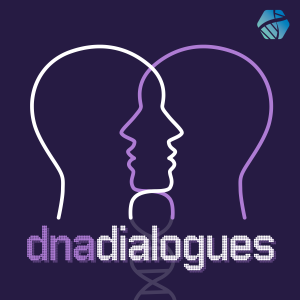
Thursday Apr 25, 2024
#3 Diagnostic Odysseys with Secondary and No Primary Findings
To celebrate DNA Day we are releasing our April episode exploring concepts related to the diagnostic odyssey, whole genome sequencing, and results returned.
Segment 1: A Journey of Hope and Resilience
In our first segment, we delve into the research conducted by Celine Lewis, focusing on the emotional impact of receiving a "no primary finding" (NPF) result from genome sequencing. This recent JoGC paper is titled, “The disequilibrium of hope: A grounded theory analysis of parents' experiences of receiving a “no primary finding” result from genome sequencing.”
Celine's study uncovers the multifaceted journey of parents grappling with the absence of a definitive diagnosis for their children. Through grounded theory analysis, two primary themes emerge: "Striving to Solve the Unsolved Puzzle" and "Navigating Hope, Lost then Found." These themes encapsulate the oscillating emotions of hope, disappointment, and resilience experienced by parents amidst the diagnostic odyssey.
Dr. Celine Lewis is a behavioural scientist working in the field of genetic and genomic medicine. She is currently at University College London Institute of Child Health, and is an NIHR Advanced Fellow. Her work focuses on how patients and families relate to, communicate and make decisions around personal genetic information, and the subsequent behavioural, psychological and social outcomes.
Through her research, Celine has worked with a range of key stakeholders including researchers in the UK and abroad, healthcare professionals and policy makers as well as voluntary organisations, patients and families. She is regularly invited to present at UK and international conferences and meetings and is increasingly asked to present her research findings to organisations such as NHS England and the Department of Health.
Key Insights from Segment 1:
- The importance of understanding the emotional dimensions of genetic testing, especially for families receiving inconclusive results.
- The dynamic role of hope as both a motivator and a coping mechanism throughout the diagnostic journey.
- Suggestions for pre and post-test counseling strategies to support families navigating genomic testing, emphasizing the significance of managing expectations and fostering adaptive hope.
Segment 2: Systematic Review of Secondary Findings
In our second segment, we explore a systematic review conducted by Lucas Mitchell and Dr. Amanda Willis, focusing on the uptake and outcomes of returning secondary findings to research participants. This recent JoGC article is titled, “Systematic review of the uptake and outcomes from returning secondary findings to adult participants in research genomic testing.”
Through rigorous analysis of existing literature, Lucas and Amanda illuminate key insights into the prevalence of secondary findings and their psychological, medical, and ethical implications. Their review underscores the critical role of researchers in navigating the complexities of result return, highlighting considerations for enhancing participant engagement and support.
Lucas Mitchell is a research genetic counsellor at the Garvan Institute of Medical Research in Sydney, Australia. He contributes to the My Research Results genetic counselling platform, an evidence-based service that supports researchers in delivering actionable research genomic findings to participants nationwide. With a Master of Genetic Counselling from the University of Technology Sydney, Lucas is passionate about helping participants and their families in understanding their research findings and facilitating access to ongoing support. Lucas’s current research interests lie within the application of genomics and returning secondary findings, and the intersection of genetic healthcare with diverse communities and improving inclusion and accessibility.
Dr. Amanda Willis is a research genetic counsellor at the Garvan Institute of Medical Research. After completing a Master of Genetic Counselling in 2013, Amanda worked as a cancer genetic counsellor in Australia and the UK and completed a PhD in 2018. Amanda’s current work is centred around the My Research Results program, developed to help research participants access their genetic information. Amanda provides genetic counselling to research participants who receive a genetic result and conducts research to understand the experiences of these participants. Through this work, she aims to increase access to genomic information and improve outcomes for research participants and their families.
Key Insights from Segment 2:
- The significance of secondary findings in research genomic testing and the need for comprehensive strategies to address participant needs.
- Key findings regarding the uptake of secondary findings and diverse outcomes experienced by research participants.
- Implications for researchers, healthcare providers, and policymakers in optimizing result return processes and promoting participant well-being.
As we conclude our exploration, it becomes evident that genetic testing transcends the realm of science, delving deep into the intricacies of human emotions and resilience. Through the insightful research of our guests, we gain valuable insights into the lived experiences of individuals navigating genetic testing, offering a glimpse into the profound impact of hope, disappointment, and adaptive coping mechanisms.
Stay tuned for the next new episode of DNA Dialogues! In the meantime, listen to all our episodes Apple Podcasts, Spotify, streaming on the website, or any other podcast player by searching, “DNA Dialogues”.
For more information about this episode visit dnadialogues.podbean.com, where you can also stream all episodes of the show. Check out the Journal of Genetic Counseling here for articles featured in this episode and others.
Nominate your articles, or a colleagues, here and we may feature it on the show! Any questions, episode ideas, guest pitches, or comments can be sent into DNADialoguesPodcast@gmail.com.
DNA Dialogues’ team includes Jehannine Austin, Naomi Wagner, Khalida Liaquat, Kate Wilson and DNA Today’s Kira Dineen. Our logo was designed by Ashlyn Enokian.
No comments yet. Be the first to say something!